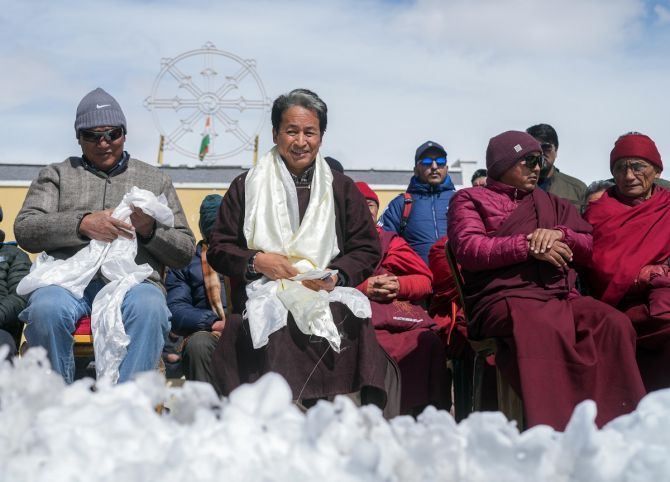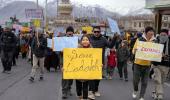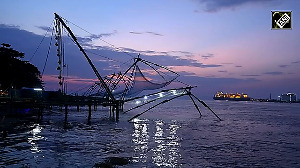Shops and business establishments were closed as thousands of people marched on Wednesday in support of their demand for statehood and Ladakh's inclusion in the Sixth Schedule of the Constitution.

Separately, the hunger strike by climate activist Sonam Wangchuk in Leh to "remind" the Bharatiya Janata Party-led Centre of its promise to safeguard the Union Territory's fragile ecology and unique indigenous tribal culture entered its 15th day.
Responding to a call from the Kargil Democratic Alliance, which announced a half-day strike and a protest rally in the town to express solidarity with Wangchuk, a large number of people took out a rally from Fatima Chowk to Hussaini Park via the main market and raised slogans demanding statehood for Ladakh and its inclusion under the Sixth Schedule.
All shops and business establishments remained closed while those taking part in the procession held up banners, some of which read "Ladakh demands statehood and Sixth Schedule" and "Save Ladakh, Save Democracy".
The Apex Body, Leh, and the KDA -- both separate groupings of various political, social and religious organisations representing the two districts -- are jointly spearheading the agitation for various demands.
The two groups have been demanding statehood for Ladakh and its inclusion under the Sixth Schedule of the Constitution over the past four years.
The provisions of Article 370 of the Constitution, which gave a special status to Jammu and Kashmir, were abrogated on August 5, 2019, and the erstwhile state was bifurcated into the Union Territories of Jammu and Kashmir and Ladakh.
The KDA leadership addressed a huge gathering at Hussaini Park and urged the people to prepare for a long struggle following the failure of its talks with the Centre.
They also announced the commencement of a hunger strike in Kargil from March 24.
"We want resolution of our main demands through dialogue but the central government closed the door of talks on March 4 by rejecting both our main demands -- statehood and (inclusion under) Sixth Schedule -- compelling the people to hit the roads," Asgar Ali Karbalai, the KDA's co-chairman, told reporters after the rally.
He added the people of Ladakh are determined to carry forward the struggle for their rights.
"We had several rounds of talks with the government of India but, unfortunately, they have been rude and gave cold-shoulder responses. They (government) believe that they will suppress the people of Ladakh with the might of their power but this is not going to happen as we will remain steadfast and raise the demands forcefully in the coming days," he said.
Karbalai said the KDA leadership is leaving for Leh on Thursday and will meet the ABL leadership to chalk out a joint strategy and roadmap to carry forward the agitation with more vigour.
"We are united and the people of Kargil will always remain in the forefront of the agitation," he said.
In Leh, Wangchuk said he is fine surviving on just water and salts.
"Along with me, 125 people slept hungry outdoors under clear skies (in minus 11 degrees Celsius). Let us understand that saving Ladakh's glaciers is not just a concern for the people of Ladakh alone," he said in a post on X.
Wangchuk, through a video message, said the hunger strike is meant to remind the Centre of its promises to safeguard Ladakh's fragile ecology and its unique indigenous tribal culture.
"…We all know global warming melts these (Himalayan) glaciers but many of us don't know is that apart from global warming, which has to do with the lifestyle of the people in all the cities of the world, what affects the glaciers equally is the black carbon or soot that is released by local human activities," he said.
He said when the glaciers go away, the locals in Ladakh will become "climate refugees" because these are their lifeline.
The activist said, "But this will also mean that the entire north India will not have water reserves from winters till spring. They will only have rainfall, which is erratic and not dependable."
Wangchuk further said, "This does not affect only us in Ladakh, it is your problem also and, therefore, we should on one hand change the lifestyle of people in big cities and secondly demand from the government to safeguard this sacred water reservoir of the nation -- the abode of Shiva from the attacks of industrial and mining lobbies and that is why people in Ladakh are demanding Sixth Schedule safeguards."
Communist Party of India-Marxist leader Mohammed Yousuf Tarigami also extended support to the people of Ladakh on the issue.
"We never desired for Ladakh to be separated from the (erstwhile) state of Jammu and Kashmir. Yet, it happened abruptly against our wishes. While a faction of society in Leh were demanding Union Territory status for Ladakh and celebrated it later, they now acknowledge the drawbacks and express a preference for constitutional guarantees for their empowerment," he said in a statement.
"We share a common history and concerns for Ladakh, resonating deeply with the aspirations of its people. It's imperative for the government to heed their voices and address their grievances promptly," he added.











 © 2025
© 2025